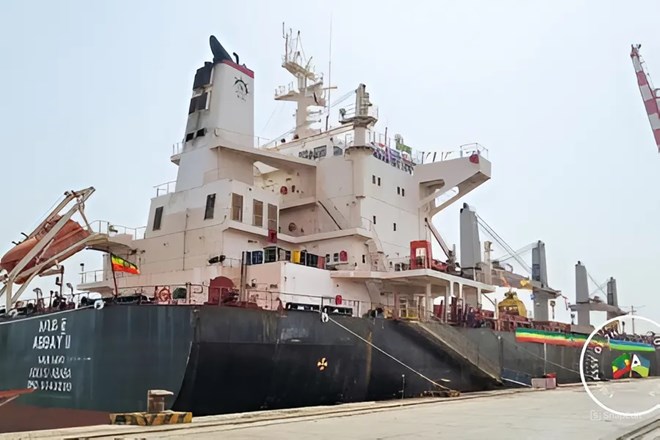
Monday March 10, 2025

Ethiopia’s largest commercial vessel, Abay II, docked at Djibouti’s port for the first time on June 25, 2023, as part of the country’s expanded shipping fleet. CREDIT: FBC/Yonathan Yoseph.
Mogadishu (HOL) — Ethiopia has ordered six new commercial ships to expand its trade capacity as part of broader efforts to strengthen its economic position and secure direct maritime access, the Ethiopian Shipping and Logistics Services Enterprise (ESL) confirmed Monday.
Two of the newly acquired vessels—both Ultramax dry bulk carriers with a capacity of 62,000 metric tons each—have already been delivered and are now operational, according to state-run Fana Broadcasting Corporation. The remaining ships, which include container vessels (ETUs) capable of carrying between 3,000 and 4,000 containers per voyage, are expected to arrive next year.
Ethiopia, a landlocked country dependent on Djibouti for more than 90% of its trade, currently operates a fleet of 10 commercial ships, including the Abay II, a 63,000-ton bulk carrier. Ethiopian officials argue that an expanded fleet will reduce logistical costs and improve trade efficiency for Africa’s fifth-largest economy.
The ship acquisitions come as Ethiopia intensifies its push for maritime access, with Prime Minister Abiy Ahmed openly stating that Ethiopia “needs a direct outlet to the sea.”
In January 2024, Ethiopia signed a controversial Memorandum of Understanding (MoU) with Somaliland, offering recognition of the self-declared independent region in exchange for access to 20 kilometres of coastline for 50 years. The agreement, which would grant Ethiopia rights to develop a naval base and commercial port, was immediately rejected by the Somali federal government, which considers Somaliland part of its sovereign territory.
Mogadishu has since taken diplomatic action, securing backing from the Arab League, the African Union, and key regional allies in opposition to the deal. Somali officials have reiterated that any negotiations concerning port access must be conducted directly with the federal government, not Somaliland. Meanwhile, Turkey has stepped in as a mediator, with the Ankara Declaration laying the groundwork for future discussions between Ethiopia and Somalia over maritime trade agreements.